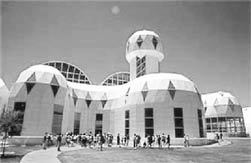Guilford College is partnering with Columbia University to allow up to eight Guilford students to study each semester at Biosphere 2, an enormous closed ecosystem in Arizona.Guilford College is only the second school in North Carolina, after Davidson College, to work with Columbia in offering this program to students. There are three semester programs offered: an earth program, a universe program and a biosphere research program. All three are available to Guilford students.
Biosphere 1 is a name for the Earth, and explains the name Biosphere 2, which is a 3.15-acre human-made closed ecosystem in Oracle, Ariz. This huge structure contains five biomes: a desert, a marsh, a savanna, a rain forest, and an ocean.
Junior biology and English double major Alison Goss has applied and been selected to take advantage of this opportunity next semseter. She will be one of 300 students from around the world who will study there during the earth semester.
Goss is enthusiastic about studying there.
“I’ll get to study my field of interest in a wonderful environment full of other people who are just as excited about science as I am,” Goss said.
All of the programs – the earth, universe, and research semesters – run every semester and students receive 16 credits for their study. The price of the program is $15,940 for the earth semester and $15,765 for the universe and research semesters.
Built in the late 1980s, Biosphere 2 is located in Arizona in the foothills of the Santa Catalina Mountains, just north of Tucson. It was originally designed to be a self-contained ecosystem where scientists, sealed off from the outside world, would live and study the way ecosystems work.
From Sept. 1991 to Sept. 1994, two different teams of scientists lived and studied in Biosphere 2. Although research continues to take place there, scientists no longer live there and it was officially opened to the public in Nov., 1996.
Since then it has become a place of both pleasure and study. The habitat is now a hands-on, interactive science center dedicated to providing a better understanding of how the earth works.
David Barnhill, professor of religious studies and supporter of the environmental studies concentration said, “Through core classes, electives, and research in the social sciences and natural sciences, students will look at the environment from a scientific and policy perspective.”
Barnhill is available for further questions and information about the program if anybody is interested.
This program is available to any Guilford college student who is interested, not just science majors.
Goss suggested that “anyone else interested in experiencing hands-on environmental science in a beautiful setting should apply to the program and take advantage of the wonderful opportunity that Guilford is providing.

